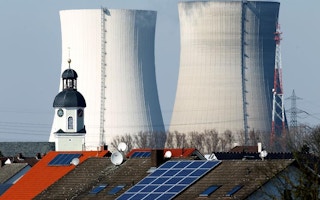Germany’s air pollution is set to worsen for a second year, the first back-to-back increase since at least the 1980s, after Chancellor Angela Merkel’s decision to shut nuclear plants led utilities to burn more coal.
The nation, which is seeking to lead European climate-protection efforts, probably will produce higher greenhouse-gas emissions in 2013 on top of a 1.5 percent gain last year, according to the DIW economic institute, which acts as an adviser to the government.
Utilities led by RWE AG (RWE) and EON SE boosted hard coal imports 25 percent in the first quarter to 10 million metric tons, the nation’s Coal Importers Association said. With elections due in September, the move is a blow to Merkel, a former environment minister who helped negotiate the 1997 Kyoto accord curbing carbon dioxide and other greenhouse gases.
“The trend of rising German CO2 emissions is alarming,” said Claudia Kemfert, who heads the energy unit at the Berlin-based DIW. “Climate protection is a key target of the government and greenhouse gases should fall, not climb.”
Coal is the most polluting fossil fuel and is blamed by scientists for contributing to global warming. Merkel opted to shut nuclear power plants after an earthquake in Japan two years ago resulted in meltdowns at reactors owned by Tokyo Electric Power Co.
Nuclear’s replacement
Merkel’s government is seeking to more than triple the share of renewable power consumed in Germany by 2050. Coal has become cheaper than natural gas for power generators, helping the more dirty fuel gain share in the energy mix of Europe’s largest economy. The shift has been noticed by environmental campaigners and threatens to fuel the election debate.
“The increase of coal is disastrous for climate policy and a bad signal for progress of Germany’s energy switch,” said Gerald Neubauer, a campaigner for Greenpeace, which demonstrated against lignite strip-mining at three locations in Berlin and in neighboring Brandenburg on July 26. “The Merkel government doesn’t do enough to protect the climate anymore.”
The Green party, Germany’s second-biggest opposition group, is against building new coal plants and prefers natural gas.
Merkel herself has expressed concern about the shift, saying at an energy conference in Berlin on June 12 that “it can’t be right in the long term” that the market favors coal over cleaner-burning natural gas.
Pollution rising
Even so, Germany emitted the equivalent of 931 million metric tons of CO2 equivalents last year, which was up from 917 million tons the year before, the Environment Ministry said in February.
“We must make sure that this was an exception and that it doesn’t become a trend that’s repeated,” Environment Minister Peter Altmaier said then.
“We’re tracking this development with great concern,” Juergen Maass, a spokesman for the Environment Ministry, said July 26 by phone, declining to comment further.
Merkel in 2011 ordered the country’s eight oldest atomic reactors that provided near CO2-free power to be unplugged. She wants to shut the remaining nine by 2022.
To fill the gap, her government wants utilities to build 10,000 megawatts of modern gas- and coal-fired generators this decade, replacing older plants. She also unleashed a boom in wind and solar power construction.
Coal vs gas
So far, mainly coal plants have gotten the go-ahead. Gas plants, which run mostly in the middle of the day when demand peaks, are losing money as the surging number of wind and solar plants flood the grid with cheap power.
Operators of coal-fired plants will make a profit of 8.85 euros a megawatt-hours if they run their units next month, based on current coal, power and emission prices for the period. Gas-fired plants post a loss of 18.74 euros a megawatt-hour, according to a calculation by Bloomberg.
“Climate change has quite frankly slipped to the back burner of policy priorities,” IEA Executive Director Maria van der Hoeven said on June 10.
Coal is favored because the cost of pollution is so low. Certificates to offset a ton of CO2 on the European Union emissions control market have averaged $4.32 so far this year compared with $17.18 in 2008.
RWE, Europe’s biggest corporate CO2 emitter, generated 62 percent of its power with coal in the first quarter. It has in the past year benefited from dropping prices for the fuel and the collapsing cost of burning CO2 on the carbon-trading system.
Closing gas
EON, Germany’s largest utility, said earlier this month it will close its unprofitable 430 megawatt gas-fired Malzenice plant in Slovakia in October. It kept open its Irsching gas plant in Bavaria only after a deal signed with the German grid regulator restored profitability at the unit.
Germany has reduced its greenhouse gas output 25.5 percent since 1990, exceeding its commitments under the Kyoto Protocol.
Further reductions will be difficult. Six coal plants with a combined capacity of 4,536 megawatts are due to start generating in Germany this year, according to data from the Bundesnetzagentur grid regulator. That compares with shutdowns of four plants with as much as 623 megawatts this year.
“Coal plants are the only plants that can be operated at profit at the moment, and that’s why their share is rising and rising,” Kemfert said June 27 by e-mail.










